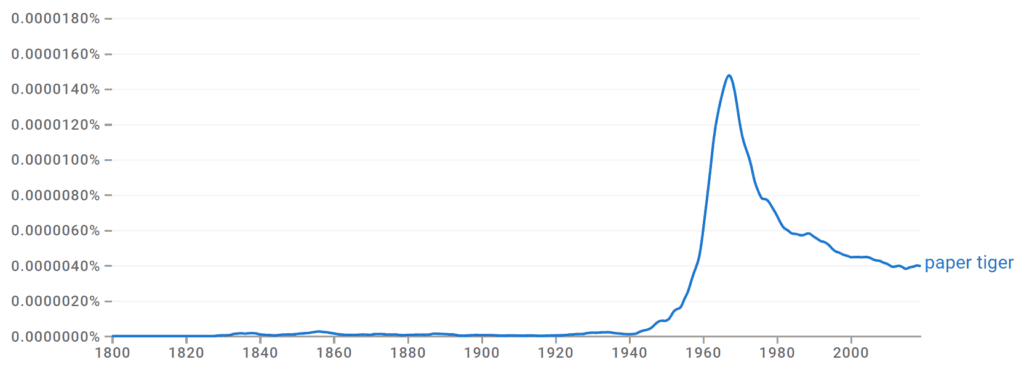As non-threatening as it sounds, the expression paper tiger is an ancient metaphor related to threats and war. But does it hold the same meaning today? Let’s unfold the details surrounding this idiom and discover how you can use it in conversation and in your writing.
Paper Tiger Meaning Explained

The phrase paper tiger paints a rather peculiar picture—a carnivorous feline crafted from flimsy material. But, of course, language isn’t always literal, and there are no real tigers here. The term is meant to describe something or someone that appears threatening or powerful but is ineffectual and weak when challenged.
It’s all in the presentation, like a meticulously folded origami tiger, but the substance might not match the intimidating exterior.
A great example that anyone can understand is legal jargon. Whenever you sign an agreement or buy something that involves a lawyer, there’s always a hefty stack of papers filled with confusing legal terms and intimidating parameters. But underneath it all, it’s just a basic legal contract that states a simple fact.
Origin and Etymology of Paper Tiger

The phrase paper tiger comes from the world of Chinese proverbs. The specific Chinese phrase zhilaohu directly translates to paper tiger, and Chairman Mao Zedong popularized it during the mid-20th century.
Mao used the term as a metaphor for imperialism, suggesting that Western powers might appear fierce but was fundamentally weak and could be defeated. But he didn’t actually coin the expression. It was used earlier, in 1836, by Sir John F. Davis:
“A blustering, harmless fellow they [the Chinese] call ‘a paper tiger’.”
Synonyms for Paper Tiger
Just as a single tiger can have many stripes, a single phrase can have many synonyms. Let’s explore some alternative phrases you can use.
- Hollow threat
- Toothless tiger
- Bluff
- Bark worse than one’s bite
- Empty suit
Paper Tiger Examples in a Sentence

Sometimes it’s just easier to see a word or phrase in action, like in a full sentence. So here is a handful to get you started.
- My company’s strict dress code is a paper tiger—it’s hardly ever enforced, so don’t worry about it.
- Despite his loud boasting, their new boss turned out to be a paper tiger with hardly any real authority.
- The threats of the dictator turned out to be nothing more than the roar of a toothless paper tiger when the international community stepped in.
- The policy designed to address climate change was criticized as a paper tiger, lacking concrete measures and sufficient funding.
- The other soccer team’s star player talks a big game, but on the field, he is just a paper tiger.
- The qualifications are impossible to meet, but I know now that they’re just a financial paper tiger.
- I know my parents’ rules seem harsh, but they’re just a type of paper tiger because Mom and Dad never really enforce anything.
How would the West have conducted itself during the Cold War had it known in 1945, 1970 or even 1985 what we know now—that the Soviet Union was a paper tiger that disguised internal weakness and defense shortcomings with extravagant expenditures on the arms race, aggressive posturing and obsessive focus on propaganda abroad? (The Jerusalem Post)
Roaring Off
Remember, it’s always about more than appearances. So next time you encounter something seemingly fearsome, consider whether it might just be a paper tiger. Keep adding more idioms and cool expressions like this to your vocabulary, and check out my other helpful guides!
